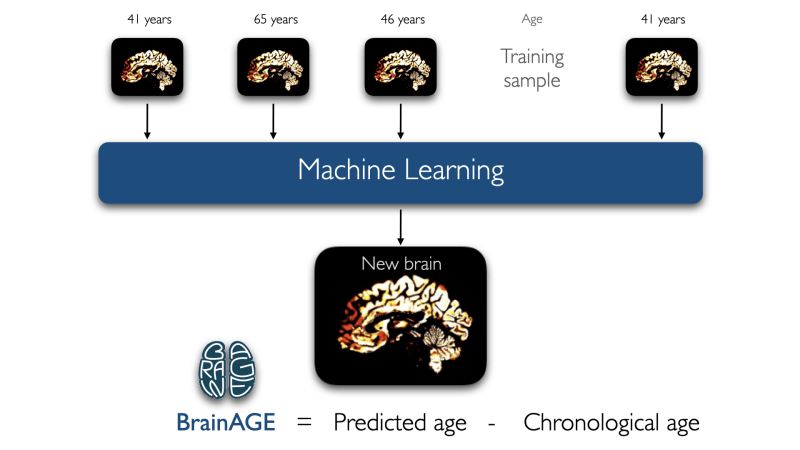BrainAGE: Use of machine learning methods for prediction of individual brain age. The difference between estimated and chronological age is termed Brain Age Gap Estimate (BrainAGE).
Graphic: Christian GaserPrincipal Investigator: Christian Gaser
The research group "Structural Brain Mapping" belongs to the Departments of Neurology and Psychiatry of the Jena University HospitalExternal link. Its research focus is the development and application of methods to analyze brain structure in MR images. This involves segmenting areas of gray and white matter to analyze their local distribution. For example, it is known that age-related changes in gray matter exist.
We have developed a method that learns these age-related changes throughout the brain using a machine learning algorithm. The aging pattern is trained in a large sample and can then be then used for a new MR image to predict the so-called BrainAGE on an individual level. The estimated BrainAGE is then compared with the chronological age and the difference provides information on whether, for example, an accelerated aging process is present. The advantage of this method is that the complex aging pattern over the whole brain can be expressed in just one value.
In this subproject, we will use this method to retrospectively use data from the UK BiobankExternal link as well as from the LIFE-Adult studyExternal link to investigate the relationship between MRI-based BrainAGE and a variety of different health and lifestyle parameters. To do this, we can draw on MRI data from subjects aged 40 to 69 years, as well as blood and urine, genotyping, sociodemographic data, cognitive function, diet, physical activity, and many other parameters and tests available for LIFE-Adult and the UK Biobank. These data will be used to find potential risk but also protective factors for brain aging in healthy adults. Furthermore, the subproject pursues the idea to compare brain aging with psychological aging within the framework of the "Aging as Future" Study. For this purpose, MR images for BrainAGE determination will be acquired twice in 100 subjects of the study at an interval of 3-4 years. These data will then be compared with other aging markers. In addition, BrainAGE will also be measured in the intervention study on mice planned in the consortium.
Doctoral researcher: Polona Kalc
